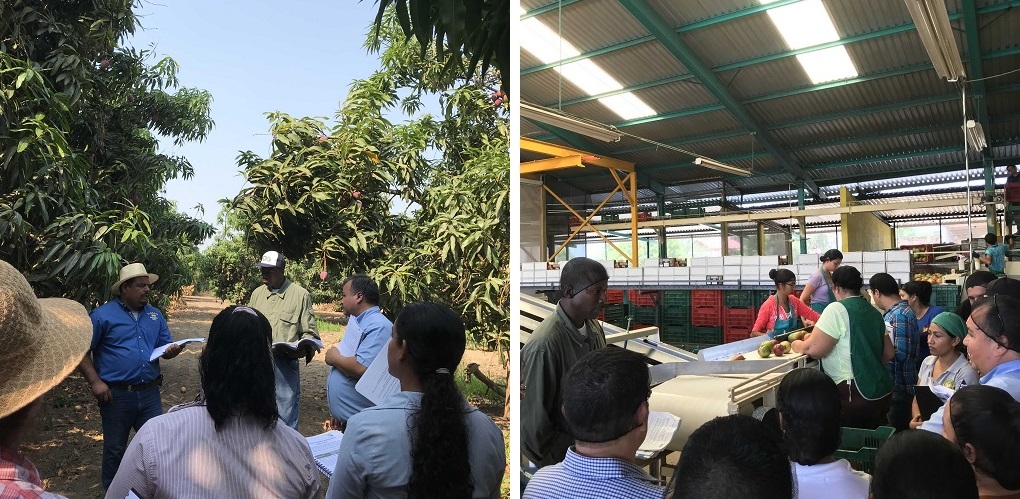The Inter-American Institute for Cooperation in Agriculture: An Essential FDA Partner
FROM A GLOBAL PERSPECTIVE
By Katherine (Katie) Serrano
August 23, 2022
For 75 years, the Inter-American Institute for Cooperation in Agriculture — or IICA — has been working to advance the agricultural development and rural well-being of Member States* across the Americas. IICA is based in Costa Rica but maintains a network of over 30 countries located throughout the Americas, with its primary focus on providing education and technical expertise in agricultural areas.
When the FDA began rolling out its seven major rules that would implement the landmark Food Safety Modernization Act (FSMA), IICA became an important, indeed essential, FDA partner. FSMA shifted the FDA’s approach from responding to foodborne illness to preventing it, with food safety activities throughout the supply chain.
Since 13% of all food products consumed in the United States are imported, and with imports accounting for even higher percentages for certain types of food, the agency recognized the need to collaborate on prevention activities with stakeholders from around the world. The International Food Safety Capacity-Building Plan developed by the FDA provides a strategic framework for such work, including examples of how the FDA could expand the technical, scientific, and regulatory capacity of foreign governments and their respective food industries. To help facilitate FSMA implementation in Latin America, the FDA turned to IICA, which offered on-the-ground experience throughout the region.
The FDA awarded the first of two cooperative agreements (CoAg) with IICA in 2017 (CoAg1 2017 - 2021). Under this CoAg, the FDA and IICA worked together to research different strategies for developing an expert cadre of food safety stakeholders, including regulators, industry, producers, universities, and trade associations. As a foundational step, IICA and the FDA identified cultural, language, financial, and logistical barriers to meeting FSMA’s training requirements. IICA then devised a multifaceted approach to addressing those challenges and collected data on the effectiveness of the various strategies.
Specifically, to provide training in FSMA’s Produce Safety Rule, the FDA and IICA selected highly talented produce experts from across Latin America to attend “Train the Trainer” courses developed by the Produce Safety Alliance (PSA), a collaboration between Cornell University, the FDA, and the U.S. Department of Agriculture. The FDA and IICA used their own vetting approach and criteria to ensure participants in this program would be most likely to meet the Produce Safety Alliance’s criteria to become “Lead Trainers” for Produce Safety. This unique vetting approach and the Train the Trainer modality resulted in a high success rate of participants becoming Produce Safety Lead Trainers and a network of educators who in turn could train hundreds of people on FSMA rules.
The PSA’s Train the Trainer Curriculum for FSMA’s Produce Safety Rule (PSR) is one example of the multiplier effect that can be achieved by investing in a cadre of trainers. IICA offered this course six times in various locations, with participants from across Latin America. Through this program, a total of 364 people became Produce Safety Alliance (PSA) Trainers, and 96 became PSA Lead Trainers. Trainers in two of the courses in Costa Rica committed to train at least 125 people for free. As a result, 5,916 growers from Latin America and the Caribbean received training in the PSR—a requirement for all covered farms—under PSR/FSMA.
IICA achieved a similar impact with its Train the Trainer course addressing FSMA’s Preventive Controls for Human Food. Three courses were offered, one each in Chile, Ecuador, and Mexico, that trained 69 Lead Instructors who in turn trained 746 people.
At the same time, IICA created an instant messaging group for the Latin American PSA Trainer cadre to maintain contact and facilitate communication between experts in the hemisphere. The group is still active, with over 107 members, and has supported FSMA compliance and promoted the exchange of relevant information and collaborative work among trainers.
Other outreach and education models researched under the FDA’s CoAg1 with IICA included:
- Conducted research on the development of an 11-part Produce Safety webinar series that provided key FSMA information in Spanish and English, drawing over 4,000 participants from 32 countries. IICA collected extensive data from webinar participants, identifying training needs covering not only Produce Safety and Preventive Controls, but also two other FSMA rules of importance to importers: Intentional Adulteration, and the Foreign Supplier Verification Program.
- Provided additional coaching during and after courses to help guide trainers to become Lead Trainers. The PSA Trainers who participated in the program experienced higher than normal success rates in becoming Lead Trainers, indicating that a more comprehensive approach would improve outcomes for trainees.
- IICA also conducted research regarding the use of voluntary educational programs known as international On-Farm Readiness Reviews (iOFRR). These reviews are designed to foster and promote the FDA’s approach to “educate before and while we regulate” under the PSR by guiding the farmer through their on-farm operations, providing real-time information to support growers in understanding and complying with the produce rule. In 2019 and 2020, IICA and the FDA conducted reviews of pineapple and berry farms in Costa Rica and Chile. In total, this collaborative effort reached 12 farms, 77 participants, and resulted in 20 newly trained reviewers.
Following the success of the first CoAg, the FDA awarded a second Cooperative Agreement (CoAg2) to IICA in 2019 to research the efficacy of supplemental materials designed to augment produce safety trainings. This agreement seeks to take advantage of the widespread availability of mobile technology in the region. Growers will be encouraged to download IICA-developed apps and videos that reinforce PSA grower trainings, and IICA will measure how effective these materials are in improving the growers’ understanding of produce safety.
There have been inevitable challenges — and opportunities — during our ongoing collaboration. From early 2020 through the end of the CoAg1, the COVID-19 pandemic made it difficult to execute some of the activities of the first cooperative agreement. However, IICA, in coordination with the FDA’s Latin America Office, developed strategies to circumvent these obstacles and still achieve our objectives. Together, we learned new ways to communicate, teach, and collaborate remotely.
IICA’s broad network of contacts in industry, academia, and government, and their reputation as regional experts in agriculture and food safety have helped the FDA achieve results it would never have been able to achieve alone. We highly value our relationship with IICA and look forward to years of future collaboration.
*IICA member states include: Antigua and Barbuda, Argentina, Bahamas, Barbados, Belize, Bolivia, Brazil, Canada, Chile, Costa Rica, Colombia, Dominica, the Dominican Republic, Ecuador, El Salvador, Guatemala, Grenada, Guyana, Haiti, Honduras, Jamaica, Mexico, Nicaragua, Panama, Paraguay, Peru, Saint Kitts and Nevis, Saint Lucia, Saint Vincent and the Grenadines, Suriname, Trinidad and Tobago, the United States, Uruguay, and Venezuela.*
Katherine (Katie) Serrano is the director of the Latin America Office in the FDA's Office of Global Policy and Strategy.




